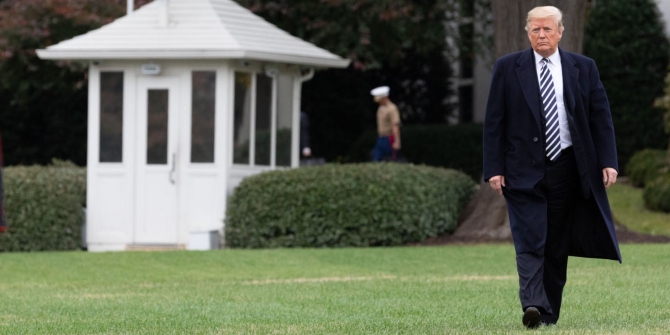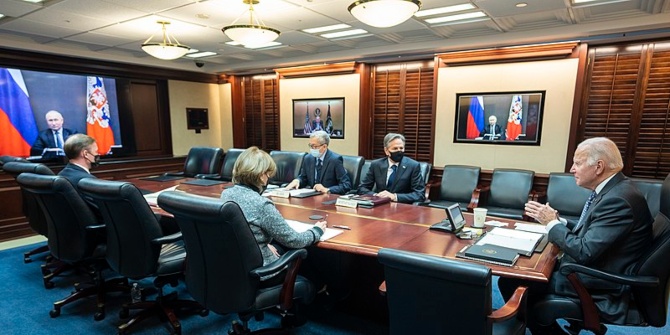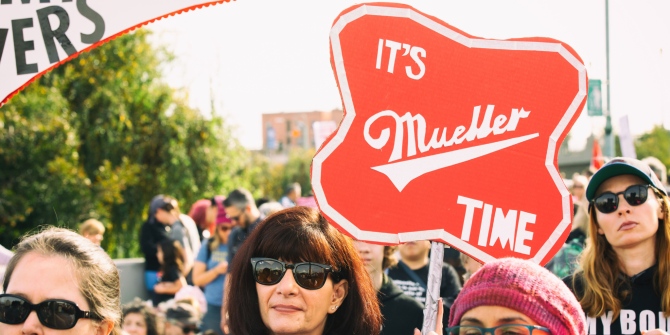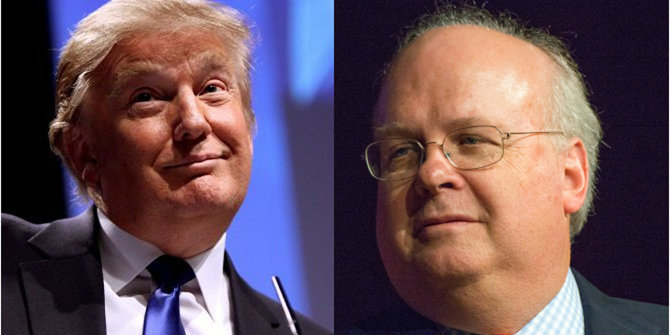 With less than four months remaining until the presidential election, former Vice President Joe Biden holds a substantial lead over President Trump in the polls. US Centre Director, Professor Peter Trubowitz writes that the COVID-19 pandemic means that there will be far more absentee ballots cast this year, and that we should not discount the likelihood of President Trump using this difference to claim that the final result is a fraud if he does not win.
With less than four months remaining until the presidential election, former Vice President Joe Biden holds a substantial lead over President Trump in the polls. US Centre Director, Professor Peter Trubowitz writes that the COVID-19 pandemic means that there will be far more absentee ballots cast this year, and that we should not discount the likelihood of President Trump using this difference to claim that the final result is a fraud if he does not win.
If the US presidential election were held today, former Vice President Joe Biden would win soundly. The Democrats would likely take the Senate while maintaining firm control of the House. Most of the polls are pointing in this direction (see here and here). However, the election is not being held today. There is time for Trump to close the gap, and in 2020, the year of the absentee ballot, that may be all Trump thinks he needs to claim victory.
It is a safe bet that Trump will do whatever he can to stay in the White House, including claiming the election was a fraud. Indeed, he is already preparing the ground for this by claiming that absentee ballots are unreliable. Absentee voting in November is going to take place in record numbers because of the COVID-19 pandemic. And a disproportionate number of those ballots will likely be cast by Democratic voters, especially since Trump is urging Republicans to vote in person. Those absentee ballots will take days, and in some cases longer, to count. This could mean that the Election Day state tallies we see on November 3 look more favorable for Trump than the final tallies, once all the absentee ballots are counted.
Consider, for example, last month’s special election in New York’s 27th Congressional district. This is a seat that Trump won by 25 percent in 2016. Chris Jacobs (R) led Nate McMurray (D) 70 percent to 28 percent on election night, but as of Wednesday, his edge had dropped to just 53 percent to 45 percent. Jacobs will likely win the seat (most absentee ballots have been counted), but the considerable change in the margin since election night is indicative of how much the presidential vote could change in the days following the November 3 election (see here for one scenario).
It doesn’t take much imagination to see why Trump’s claims that absentee voting is fraudulent, baseless as this claim is, could matter come November. If the presidential race comes down to a few close battleground states and the Election Day returns favor Trump, you can bet that Republicans will contest absentee ballots to raise doubts in many voters’ minds about the integrity of the process. Little wonder that Biden has hired more than 600 lawyers to insure that voters get to cast their ballots, and also to make sure absentee ballots are properly and fairly counted. (For more information about perceptions of voting integrity across the fifty states, see here.)
For Trump, driving down Biden’s sizable lead in the polls is the immediate challenge. Look for Trump to try to deflect blame toward everyone and anyone for his gross incompetence in handling COVID-19 — China, the Democrats, Dr. Anthony Fauci, Antifa, etc. Biden’s challenge is the opposite: to keep voters focused on Trump’s botched handling of the health care crisis. This is Trump’s key weakness and Biden’s best bet for turning the election into a referendum on Trump, and to ensure the election doesn’t come down to a debate over absentee ballots.
- “Absentee Ballot received” by Adam Fagen is licensed under CC BY NC SA 2.0
Please read our comments policy before commenting
Note: This article gives the views of the author, and not the position of USAPP– American Politics and Policy, nor of the London School of Economics.
Shortened URL for this post: https://bit.ly/2ONgMC9
About the author
 Peter Trubowitz – LSE US Centre
Peter Trubowitz – LSE US Centre
Peter Trubowitz is Professor of International Relations, and Director of the LSE’s US Centre. His main research interests are in the fields of international security and comparative foreign policy, with special focus on American grand strategy and foreign policy. He also writes and comments frequently on US party politics and elections and how they shape and are shaped by America’s changing place in the world.







LSE takes ideas and make these tremendous social forces improving our lives and our politics. Here is such an idea.
In the United States, 75% of the prison inmates and 80% of the violent populations, have vision problems; such as reading upside down or vision comprehension. In order to recover 1.5% to 2.0% of the Gross Domestic Product creation, make medical Vision Therapy available to the population. This will greatly lessen violence and lower crime – bringing entire areas of US Cities and rural areas back to productivity.
Vision therapy is not Optics, and is not military optics. Vision therapy greatly improves the quality of life, and increases GDP by 1.5% to 2.0% worldwide.
Dear LSE Community,
There is much controversy on the Impeachment trial here in the United States, However, the case is predicate, or brought, as upon two law cases – that are used to impeach or punish, Judges. This means that a President cannot be impeached upon cases referring to the impeachment of Judges – the constitutional separation of powers. A Judge is not a President and a President is not a Judge.
As such, the United States Senators may not vote yea or nay. To vote destroys the Separation and independence of the American Judicial System. Chief Roberts has already declared this impeachment illegal.
Here is the way out. The trial can conclude upon asking the Judicial system to make interesting, rich, local, and informed Judgements from the Courts; so powerful and wise that the ratios and legal reasoning are more interesting than the Media. Otherwise, it is the media, unelected, that will govern us, and nothing else.
I prefer Chief Justice Roberts and interesting, colorful, wise, and well-meaning Court Judgements. In America, a Judge is not a President and a President is not a Judge.